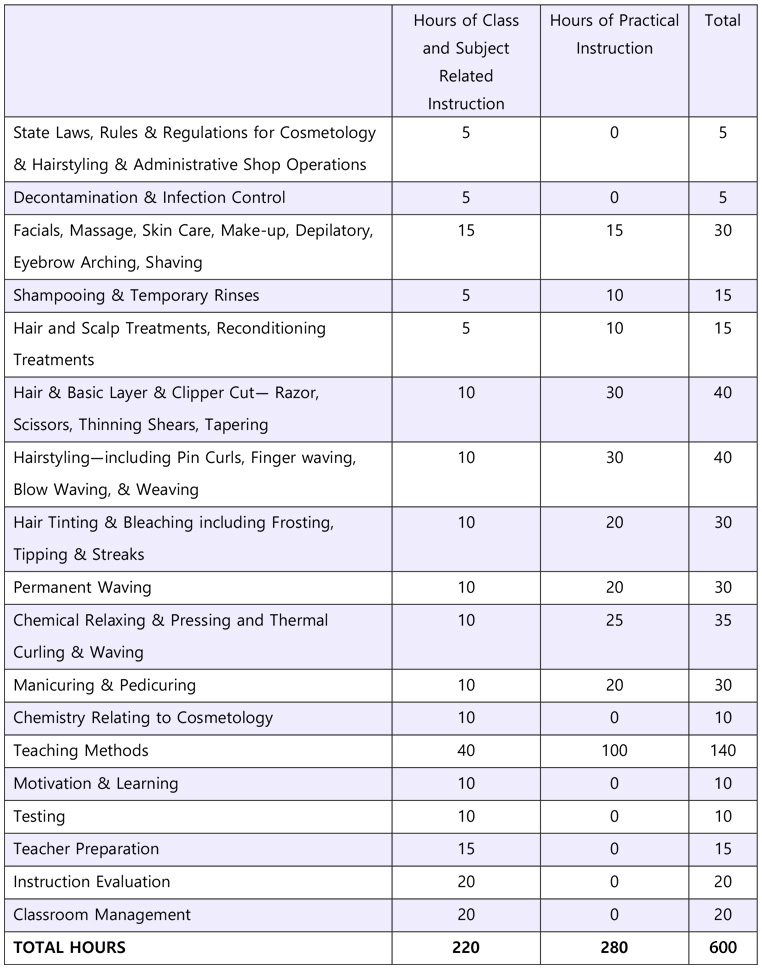Theory and Practical
Theory and Practical Hours Breakdown

1. State Laws, Rules & Regulations for Cosmetology & Hairstyling & Administrative Shop Operations (5 hours): Focuses on the legal aspects crucial for operating
within the beauty industry, ensuring educators can impart knowledge of compliance and regulations.
2. Decontamination & Infection Control (5 hours): Emphasizes the importance of cleanliness and safety measures in the salon environment, preparing educators
to teach best practices in hygiene.
3. Facials, Massage, Skin Care, Make-up, Depilatory, Eyebrow Arching, Shaving (30 hours): Offers a balanced mix of theory and practical skills in various esthetic
services, enabling future instructors to deliver comprehensive education in facial treatments and grooming.
4. Shampooing & Temporary Rinses (15 hours): Covers the basics of hair care, including shampooing techniques and application of temporary color rinses,
with an emphasis on hands-on training.
5. Hair and Scalp Treatments, Reconditioning Treatments (15 hours): Teaches the fundamentals of maintaining healthy hair and scalp, combining theoretical
knowledge with practical application.
6. Hair & Basic Layer & Clipper Cut—Razor, Scissors, Thinning Shears, Tapering (40 hours): Provides in-depth instruction in hair cutting techniques,
preparing educators to teach a range of styling methods.
7. Hairstyling—including Pin Curls, Finger waving, Blow Waving, & Weaving (40 hours): Equips future instructors with the skills to teach classic and contemporary
hairstyling techniques, through both theory and practice.
8. Hair Tinting & Bleaching including Frosting, Tipping & Streaks (30 hours): Focuses on the art and science of hair coloring, offering hands-on experience in various
tinting and bleaching methods.
9. Permanent Waving (30 hours): Prepares educators to teach chemical hair texturing techniques, with a balance of theoretical instruction and practical training.
10. Chemical Relaxing & Pressing and Thermal Curling & Waving (35 hours): Combines theory and practice in teaching hair texturizing and thermal styling techniques.
11. Manicuring & Pedicuring (30 hours): Provides comprehensive training in nail care, including both theoretical knowledge and practical skills.
12. Chemistry Relating to Cosmetology (10 hours): Delivers essential information on the chemical makeup of beauty products and treatments, preparing educators
to teach the scientific aspects of cosmetology.
13. Teaching Methods (140 hours): The core of the program, focusing on pedagogical strategies, lesson planning, and effective teaching techniques,
with an emphasis on practical teaching experience.
14. Motivation & Learning (10 hours): Covers the psychological aspects of teaching and learning, equipping educators with strategies to motivate and
engage students.
15. Testing (10 hours): Focuses on the development and implementation of effective testing and assessment strategies in the cosmetology classroom.
16. Teacher Preparation (15 hours): Prepares educators for the administrative and organizational tasks associated with teaching, including curriculum
development and classroom management.
17. Instruction Evaluation (20 hours): Teaches future instructors how to evaluate teaching effectiveness and student learning outcomes.
18. Classroom Management (20 hours): Provides strategies for maintaining a positive and productive learning environment in the classroom.
